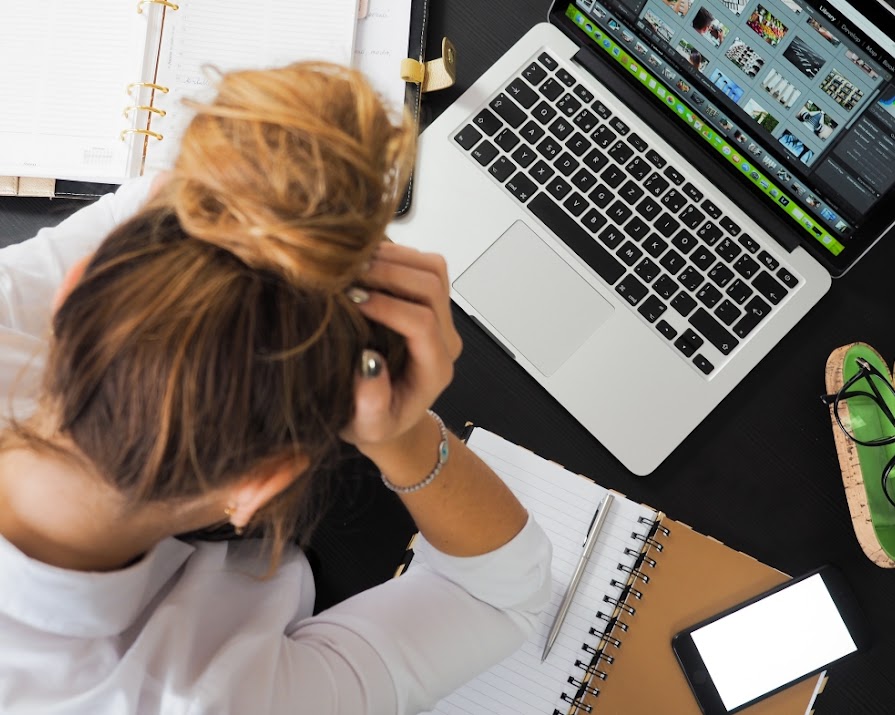By Grace McGettigan
03rd Feb 2020
03rd Feb 2020
Think your office job is relatively safe? Think again. Working at a desk can lead to all sorts of health problems. Here are seven common ones
If someone asked you to guess which job is most damaging to human health, you’d probably suggest something like ‘radiologist’ or ‘wastewater treatment operator’, but did you know office jobs are just as risky?
For a whole range of reasons, desk work can negatively impact both your physical and mental health. Here’s what’s happening and, more importantly, how to fix it.
You’re snacking more than you need to
Do you keep a stash of tasty snacks in their desk drawer? Research by Kallø found female office workers consume up to 100,000 calories worth of desk treats every year. Whether it’s biscuits for your morning cuppa, a packet of rice cakes for your afternoon slump or a sneaky bag of Minstrels – the calories add up.
While snacking doesn’t always lead to poor health, it is more likely to when combined with hours of inactivity. Try swapping your high-sugar treats for fruit or nuts. Alternatively, keep everything in the canteen so you have to walk and burn energy to get them.
Germs. Everywhere.
Factoring in everything from coughing colleagues to eating at your desk, the average keyboard, chair and computer mouse fosters approximately 21,000 germs per square inch.
It’s worth keeping sanitizer on (or near) your desk to remind you to clean it regularly. Wash your hands between touching your keyboard and handling your sandwich; better yet, eat in the kitchen. Where possible, open windows and allow fresh air to circulate through the office.
 Photo: Amy Hirschi, Unsplash
Photo: Amy Hirschi, Unsplash
You’re working more than you should
It may come as a surprise, but research carried out by recruitment website, IrishJobs.ie found nearly 40% of workers don’t take their full allocation of annual leave.
What’s worse, a third of people who do take their full holiday allowance admit to working while they’re away. Studies indicate these workers are at an increased risk of chronic stress, with no financial benefit.
IrishJobs.ie general manager, Orla Moran says, “It’s important to remember that annual leave is essentially time away from the workplace to switch off and recharge the batteries. We advise everyone to make full use of their statutory entitlement.”
You’re not taking your full hour for lunch
A survey by Total Jobs found 56% of workers in the UK don’t take their full lunch break, with the average worker only taking 27 minutes. Those who do take time for lunch often do so al-desko; the National Charity Partnership found 70% of workers spend their lunchtimes at their desks, with just 15% of female workers venturing outside the building (versus 35% of men).
An irregular eating pattern can reduce your energy levels, resulting in a weaker immune system and problems with your metabolism. Your mental health can suffer too; nobody can work at full capacity for an entire day, especially with no fuel. Give your mind and body a break. After all, you’re probably not being paid for that hour anyway.

Your chair is giving you back problems
When we move, soft discs between our vertebrae expand and contract like sponges, soaking up fresh blood and nutrients. But according to a report in the Washington Post, sitting for a long period of time causes our discs to get squashed. Consider swapping your swivel chair for a standing desk or walking desk.
Slouching often leads to pain in the back, neck, and shoulders – not to mention poor posture. Invest in a memory foam support cushion to make sitting up straight more comfortable. At IMAGE HQ, we use these ones from Amazon. It’s also worth raising your computer screen (on a stack of books or magazines, for example) so that you’re looking directly at it; not slumping down to read what’s on screen.
Sitting all day can lead to premature death
A four-year study by Columbia University Medical Centre found sitting for prolonged periods of time can make you twice as likely to die prematurely. Our muscles burn less fat when we’re sedentary and our blood flows more sluggishly. As a result, fat tends to build up around the heart, triggering high blood pressure and heart disease. A similar study by Cambridge University in 2016 found that one in six deaths per year is caused by a 9–5 office lifestyle.
You can combat this by introducing standing desks to your office, or better; walking desks. If neither of these is feasible right now, set a reminder on your phone to move once per hour. It might be worth moving the printer and other stationery items to the other side of the room; force yourself to get up and move around during the day.
 Photo: Standing Desk by Varidesk
Photo: Standing Desk by Varidesk
Your computer screen might damage your eyesight
If you find yourself getting headaches at work, it could be down to eye strain. Remember to regularly look away from your screen towards something in the distance, be it out the window or at the water cooler. It’ll give your eye muscles a chance to relax before getting back to work.
Specsavers says headaches from eye strain are often caused by excessive sunlight coming in through the window or by overhead fluorescent lights. With that in mind, use curtains or blinds and reduce the lighting where possible.
Feature photo: Energepic via Pexels
Read more: 11 things you’ll understand if you’ve ever worked in an office
Read more: How to stand out in the office when you’re an introvert
Read more: How being a single parent led me to find my dream job























